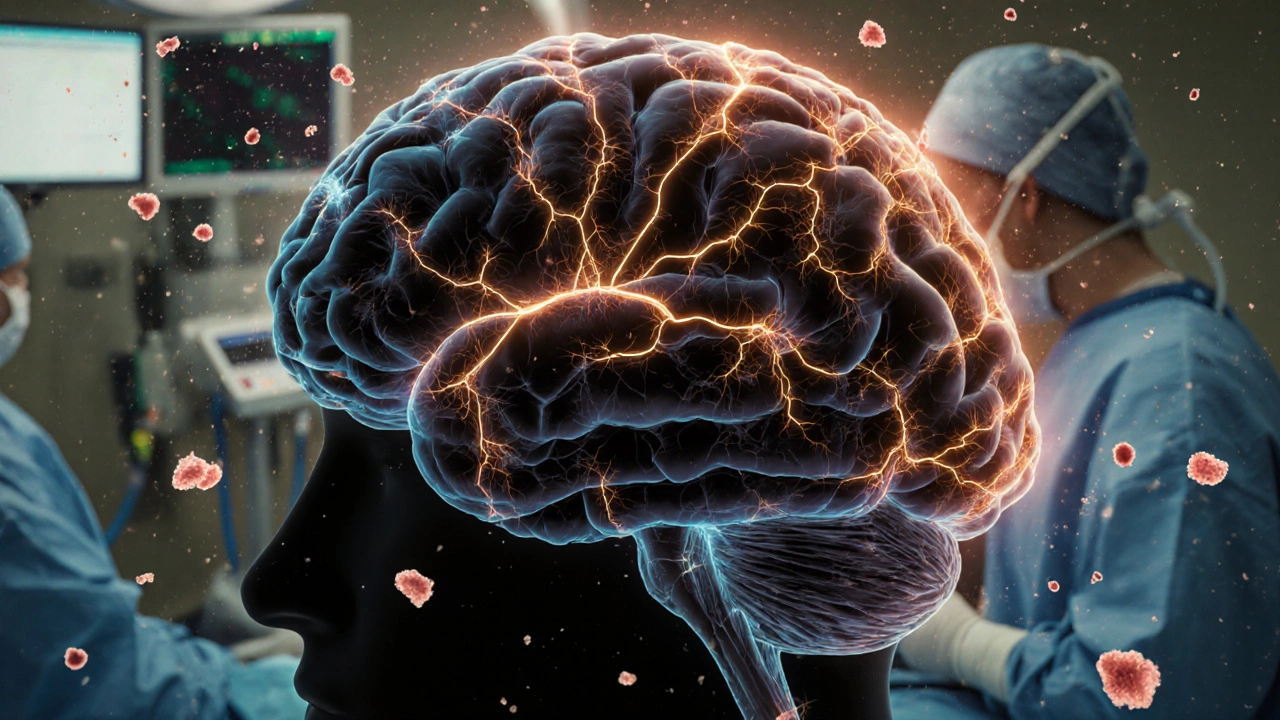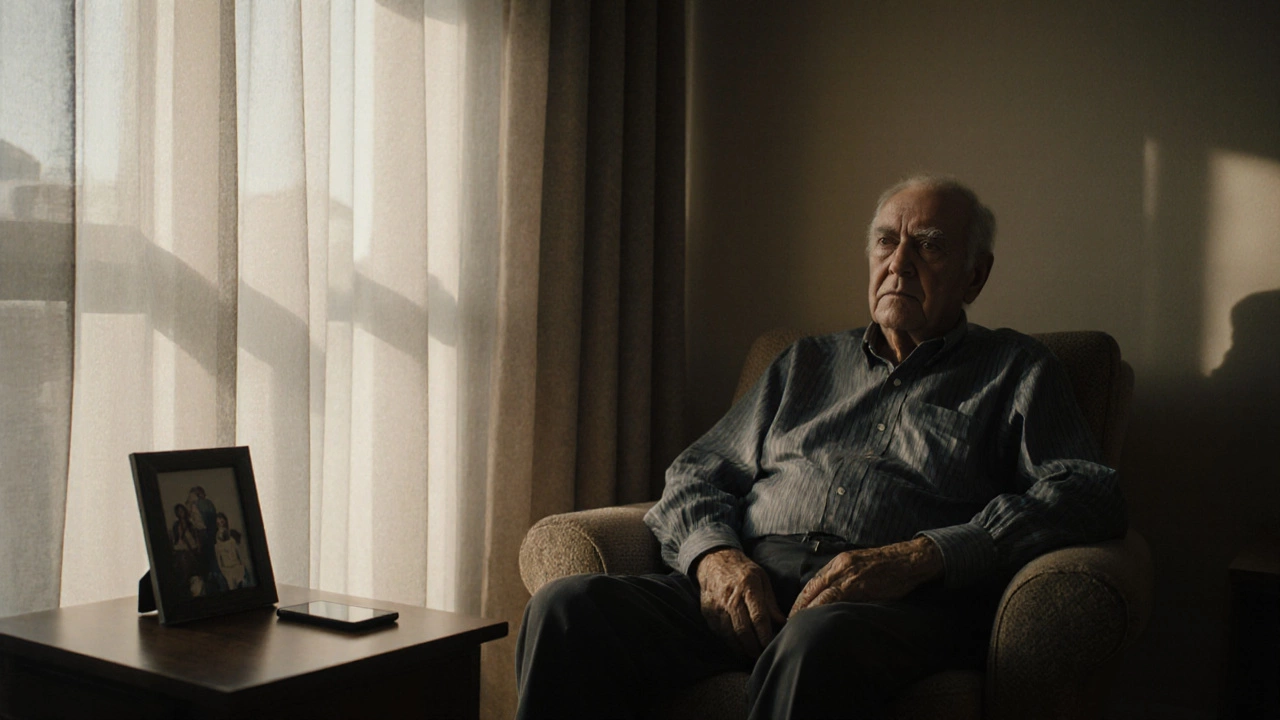After open-heart surgery, some people don’t just feel physically different-they feel like they’ve become someone else. A calm, easygoing person might suddenly snap at loved ones. A cheerful retiree could sink into silence. A once-organized parent might forget where they put their keys-or even forget their own name for a few minutes. These aren’t just bad days. They’re real, documented shifts in personality, mood, and thinking that happen to a surprising number of people after heart surgery.
It’s Not Just in Your Head
Many assume these changes are just stress, depression, or aging. But research shows something more complex is happening. A 2023 study from the Cleveland Clinic tracked 1,200 patients after bypass surgery and found that 42% showed measurable changes in memory, attention, and emotional control within three months. About 15% still had noticeable issues a year later. This isn’t rare. It’s common enough that hospitals now screen for it.The heart doesn’t just pump blood. It helps regulate brain chemistry. When surgeons stop the heart, clamp the aorta, and reroute blood through a machine, the brain gets less oxygen than it’s used to-even for just a few minutes. Tiny clots, air bubbles, or inflammatory chemicals released during surgery can cross the blood-brain barrier. These aren’t massive strokes. They’re microscopic. But they’re enough to disrupt neural pathways tied to emotion, impulse control, and memory.
What Does This Look Like in Real Life?
Meet Raj, 68, from Bangalore. He had triple bypass surgery in January. Before surgery, he was the kind of man who fixed things around the house, joked with neighbors, and remembered every grandchild’s birthday. Six weeks after surgery, he stopped talking. He’d sit for hours staring at the wall. He forgot how to use his phone. His wife said he acted like a stranger.He wasn’t depressed. He wasn’t lazy. He had what doctors call post-cardiac surgery cognitive dysfunction. It’s not dementia. It’s not psychosis. It’s a fog-a slow, frustrating blur in how the brain processes information. Some patients become overly emotional. Others shut down. Some develop anxiety out of nowhere. A few even lose their sense of humor. One patient, a retired teacher, told her doctor she no longer recognized her own reflection.
These aren’t signs of weakness. They’re signs of physical trauma to the brain. The same surgery that saves your life can temporarily scramble the wiring inside your skull.
Why Does This Happen?
There are three main reasons:- Mini-strokes (microemboli): Tiny clots or air bubbles get into brain arteries during surgery. They don’t cause paralysis, but they can kill small clusters of brain cells that control mood and memory.
- Inflammation: The body’s immune system goes into overdrive after major surgery. Inflammatory chemicals flood the bloodstream and reach the brain, disrupting neurotransmitters like serotonin and dopamine.
- Anesthesia and medications: Drugs used to keep you asleep and manage pain can linger in older brains longer than expected. Some sedatives directly affect memory centers in the hippocampus.
Age plays a big role. People over 70 are three times more likely to experience these changes. Those with prior memory issues, high blood pressure, or diabetes are also at higher risk. But even healthy 50-year-olds aren’t immune.

It’s Not Permanent-But It Can Last
Most people recover. The brain is good at rewiring itself. Within six months, 70-80% of patients return to their baseline. But for the rest, changes stick. Some never fully go back to who they were before surgery.Why? Because the brain doesn’t heal like a broken bone. It rebuilds connections slowly, and sometimes not at all. If inflammation or tiny strokes damaged key areas like the prefrontal cortex (responsible for judgment and emotional control), those functions may never fully return.
One woman I spoke with, 65, had surgery in 2023. Her personality shifted so much that her children started asking if she wanted to move to assisted living. She didn’t have dementia. She just couldn’t control her anger anymore. She’d yell over spilled tea. She stopped calling friends. Her doctor put her on low-dose antidepressants and referred her to a neuropsychologist. After six months of therapy and daily brain exercises, she improved-but she still doesn’t laugh like she used to.
What Can You Do About It?
If you or someone you love is going through this, here’s what actually helps:- Get screened: Ask your cardiologist for a cognitive test before and after surgery. Simple tools like the MoCA (Montreal Cognitive Assessment) can catch problems early.
- Move gently: Walking 10-15 minutes a day after surgery boosts blood flow to the brain and reduces inflammation. Don’t wait until you feel strong. Start slow.
- Reconnect socially: Isolation makes brain fog worse. Even short calls or visits from friends can help. One study showed patients who had weekly social contact recovered cognitive function 40% faster.
- Limit alcohol and sedatives: These slow brain recovery. Avoid them unless absolutely necessary.
- Try brain training: Simple puzzles, crossword apps, or even learning a new song on the piano can help rebuild neural pathways. Don’t wait for it to get better-help it along.
Medication isn’t always the answer. Antidepressants help some, but not everyone. Cognitive behavioral therapy (CBT) has shown better long-term results for emotional changes than pills alone.

When to Worry
Not every mood swing means something’s wrong. It’s normal to feel tired, sad, or overwhelmed after major surgery. But if you notice these signs after four weeks, get help:- Forgetting how to do familiar tasks (like brushing teeth or using the remote)
- Getting lost in places you’ve lived for decades
- Unexplained aggression, paranoia, or hallucinations
- Stopping all social contact for more than two weeks
These aren’t normal grief reactions. They’re red flags for ongoing brain changes that need medical attention.
What Doctors Are Doing Differently Now
Hospitals are changing how they handle this. In Bangalore, some cardiac centers now offer pre-surgery brain scans for high-risk patients. Others use off-pump bypass techniques-where the heart isn’t stopped-to reduce the chance of brain injury. Surgeons now monitor blood flow to the brain in real time during surgery. Anesthesia teams use shorter-acting drugs for older patients.It’s not perfect. But progress is being made. The key is awareness. If you’re preparing for surgery, ask: “Will you check my brain health before and after?” If they look confused, ask again. This isn’t a niche concern-it’s part of standard care now.
You’re Not Alone
Many people feel ashamed when they change after surgery. They think they’re losing their mind. Or worse-that they’re being dramatic. But this isn’t weakness. It’s biology. Your body fought hard to keep you alive. Your brain paid the price.Recovery isn’t just about the heart. It’s about the mind too. And healing takes time. Patience. Support. And sometimes, just knowing that what you’re feeling is real-that it’s not your fault-makes all the difference.






